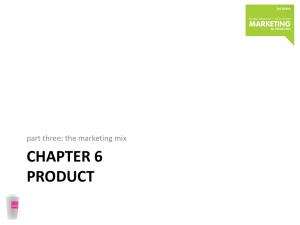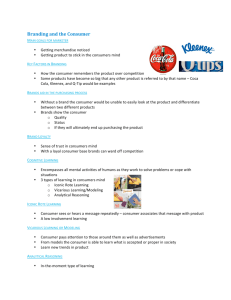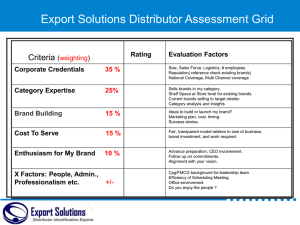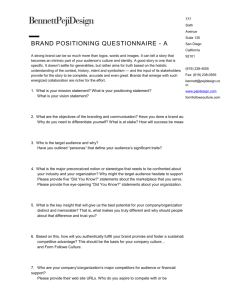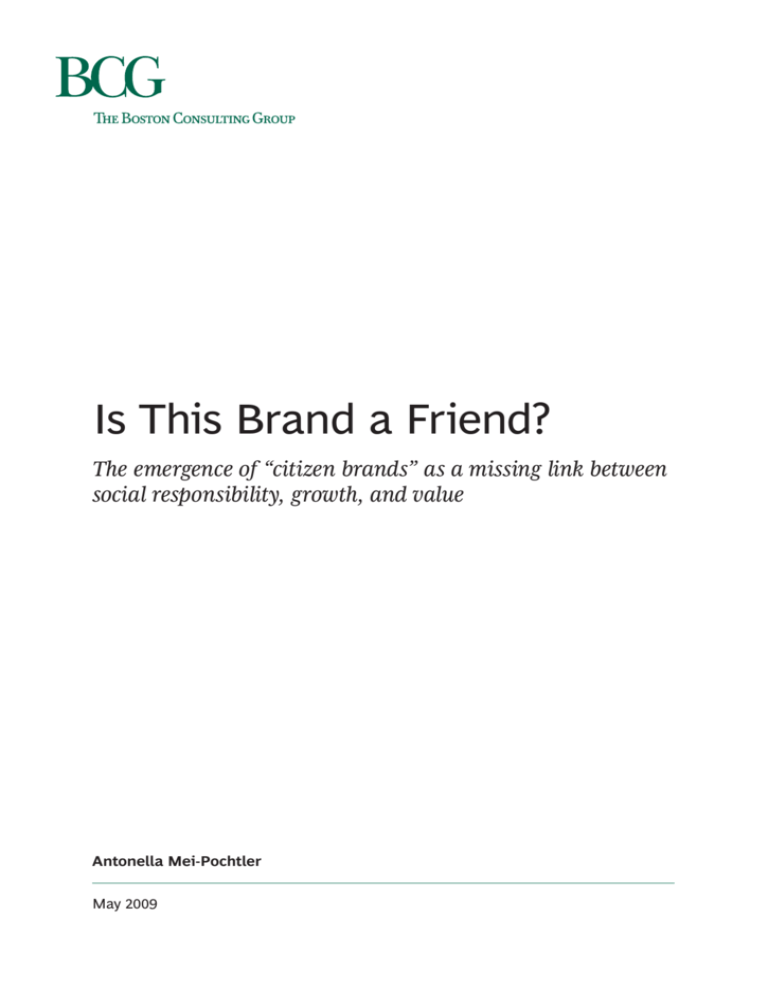
Is This Brand a Friend?
The emergence of “citizen brands” as a missing link between
social responsibility, growth, and value
Antonella Mei-Pochtler
May 2009
Is This Brand a Friend?
The emergence of “citizen brands” as a missing link between social
responsibility, growth, and value
I. Buy good, do good, feel good
“The official drink of a better world.” This was the slogan with which Bionade—a very successful German
soft-drinks company—welcomed you on its Web site, stille-taten.de. There, people could do something
good without being made public: You could send a present to someone, or decide to hide a poem between
the pages of a library book. All of this was done in complete anonymity, except for a card on which the
site’s URL was printed. Upon visiting the Web site, the receivers of the good deed found out who treated
them to the pleasant surprise, and, of course, saw the Bionade logo.
Smart thinking? Clever branding? Looks like it was. Bionade created an aura of positivism on its own
brand, inspiring and helping others to do something good. But there was more to it: The campaign built on
the simple yet powerful assertion that doing something good makes you feel good. And Bionade is associated with this positive feeling. In this virtuous circle, everyone was a winner: Bionade sold its drinks; its
consumers received a sense of self-fulfillment; and the receiver of the gift got an unexpected treat. This
goes a long way to demonstrate how the new win-win branding strategies align the desire for individual
involvement with the increasing interest in ethics shared by those who sit around the “campfire” of a
brand and its products.
The brands, which actively enter this dialog and new relationship, are moral or better: “citizen brands”
which increasingly derive their meaning and value from an incorporation of ethical and moral values dear
to their consumers in their activities, their messages, and, finally, their attributes.
(1) How consumer capitalism and Web 2.0 redefine branding
With the shift of consumer markets in developed countries from scarcity to affluence, and the enormous
increase of product and brand choices, the intangible aspects of the product and the brand become more
important in guiding the buyer’s decisions. In the era of so-called consumer capitalism, the question
changes from Does it work? to Does it fit me? Consumers’ choices integrate more and more dimensions of
the individual: Does it fit my body, my needs, my friends, my environment, my aspirations—and my values?
As the necessity to meet one’s basic needs is less relevant, buying and consuming becomes a (major)
instrument of building and expressing identity, affiliation, and social status. Consumption will therefore
reflect more sophisticated preferences. The choices between products and brands of the new “moral
consumer” do not only include the personal predilections but also her or his sociopolitical preferences.
And the Web provides an excellent support platform for this behavior: It fosters the rise of the “smart”
consumer. This sophisticated consumer does not depend on the information given by producers and is
therefore less “seduced” by advertising but rather finds out the relevant information based on the experience of her or his peers, and shops around.
With the next generation of the Web 2.0, stronger connection platforms for communities and improved
active participation and production tools for consumers emerge, which allow more fundamental ways of
self-expression and exchange, from goods (eBay) to music (KaZaA), from video (YouTube) to friends
(Facebook), and attention (MySpace). By adding interactivity to information, the Web 2.0 empowers the
single consumer and multiplies her or his collective power. Less rapidly than technology itself, experiences
and expectations change, nonetheless, fundamentally, and deeply challenge the relationship between
consumers and companies.
(2) Rising expectations to responsible (corporate) citizens
“The social responsibility of business is to increase its profits,” declared Milton Friedman in 1970, at the
beginning of a decade when traditional values, including the way of life and the belief in never-ending
The Boston Consulting Group
May 2009
Is This Brand a Friend? 2
growth and production, were questioned by many, especially young people, who shared “green” worries
about the future (as pronounced by the Club of Rome’s report The Limits to Growth). Companies active in
pharmaceuticals, energy, chemicals, and agriculture were primarily in the focus of the young people’s
concerns. The pervasive “success” of pesticides, chemical accidents like Bhopal, and the oil crisis—all of a
sudden, the “dark side” of all the comfort enabled by mass production was brought to light and showed
the interdependence between industrial, political, and social issues.
Since those days, some companies have started to change their attitude away from a “business is business”
perspective. Corporate social responsibility (CSR) has added to the inheritance of corporate philanthropy.
With the accelerating globalization, privatization, and liberalization in this, a greater demand for corporate social responsibility emerged—especially concerning the new “masters of the universe,” the global,
multinational companies. Not only consumers, products, and markets grow beyond their former limits,
the concept of CSR grew beyond them also. Reacting to (accidental) causes and donating were not enough
anymore. The concept of good citizenship, of being part of the community, to give and to share, was
applied to global companies, whose obligation is not only to be aware of their ecological, environmental,
and social impacts but also to provide the right answers to people’s concerns.
The example of many global players across industries shows that in spite of the lack of an institutionalized
“global society,” the question Which society? does not remain unanswered or restricted to the national
roots of the headquarters. Giants like Nestlé and Danone, Shell and BP, Nike and adidas—favorite targets
of the rising antiglobalization movement—have learned the hard way how direct and short the link
between workers’ conditions at a coffee plant in Colombia and the consumer in Berlin, or from a small oil
platform to a big boycott, or from a “cool” winner’s logo to a leading (bad-guy) position in a strong “no
logo!” movement, can be. The lessons have been learned quickly, and they have changed many companies
profoundly. By November 2007, more than 4,700 companies had joined the U.N.’s Global Compact, a
voluntary platform to raise (and stick to) certain standards of ecological, human, and social rights. Adidas
and Nike, both focusing on the brand and “orchestrating” a global, fast-moving value chain of different
partners in low-cost countries, have evolved as industry leaders in transparency and monitoring processes
to ensure that their partners’ working environments match their standards. AstraZeneca, the Swedish
pharmaceutical giant, decided to cope with the pharma industry’s diminishing social license to operate by
funding large-scale research to develop effective drugs that could help combat tuberculosis in the developing world.
(3) CSR on the move—from a marketing issue to the center of strategy
In one way or another, the idea of CSR has reached a level of acceptance that is comparable to the idea
that a company should have good labor relations or a Web presence. However, the concept is anything but
clear, and actions hardly follow a strategic logic. If someone has a good idea, and someone else has the
ambition to support it with resources, another pro bono project or charity is born. If the recipients are
lucky enough, the corporate donor stands out in terms of stability and (personal) continuity from other
benefactors. Over time, many companies have collected an impressive bunch of pro bono activities and
have spent a considerable amount of financial and personal resources on pro bono issues. This is good but
not enough. Private companies may continue the tradition of the Vanderbilts and Carnegies, following
their modern versions of a great Maecenas like Gates, Soros, and Branson, but public companies face the
(silent or public) questions of their shareholders: What is in it for me? and In whose name? Their challenge
is to respond to their responsibilities with a win-win solution: How can we make a difference? What do we
stand for? Why should we do that? How do we get our people involved? Will our involvement support our
competitive position and make us stronger?
Meanwhile, many examples tell the (CSR) story of two winners. Companies as different in focus, culture,
and industry as Repsol, one of the world’s ten largest oil enterprises, and Caixa Catalunya of Spain,
share the ambition and experience of a win-win CSR case. During the economic crisis in Argentina
(2001/02), Repsol answered the rising need for help by asking its own employees for ideas, which could
help surpass the crisis. Investing in social work and sustainable jobs throughout Argentina, Repsol did
not only build a reputation but social and economic capacity for the country. Caixa Catalunya’s efforts to
help establish microcredit structures in developing countries point in the same direction: They are a
means to help people, and a way to establish markets and develop sustainable relationships in emerging
markets.
The Boston Consulting Group
May 2009
Is This Brand a Friend? 3
Developing and deepening relationships is a core ability—and key success factor—in management
consulting. The Boston Consulting Group (BCG), pioneer in strategy consulting and one of the world’s
leading top-management consulting firms, has a history of social-impact work that is directly linked to its
core business of strategy consulting. Until today, our social impact is closely linked to our core competencies, which are also defined in the claims of our brand—looking beyond the obvious, looking ahead to
building sustainable competitive advantage, embracing diversity—and shape our social benefit work on a
global, on a regional, and on a local level. On a global level, we worked with the U.N. World Food Programme to optimize its processes; on a regional level, BCG Germany started the educational initiative
business@school in 1998 to close a gap between the rising relevance of business understanding and
entrepreneurial spirit, and the minor role economy and business know-how played in public-school
curricula. Today, more than 1,000 students have participated in this initiative, developed business ideas,
and learned from firsthand experience how “economy” works. Every year, more than 100 BCG consultants
team up with representatives of major client firms to coach students and to guide them through the course
and integrated competition of “best student team’s business idea of the year.” Investing in people, bringing
people together, helping them to shape their ideas, analyze, and learn is a win-win situation for all who
participate—with a clear benefit for the BCG brand.
In dealing with society, values, and time, CSR strategies affect more than just the image of the company,
they profoundly impact the identity and the “DNA” of the corporation as such. Strategic CSR has to build a
lasting link between the company, its strategy, its history, its people, partners, and clients. This moves CSR
from the borders to the core, and changes its role from a “nice-to-have” to a “must-have,” and becomes
one of the decisive future drivers of the brand.
II. In brands we trust
If anything goes, something has to stay: In a deconstructed world, stability is not a given but (increasingly)
precious good. That holds true for the individual as well as for institutions. Corporations in the 20th
century had a defined, mostly local identity. They had a place where they created and offered their goods
and services; they knew their industry, their consumers, competitors, and how to work with them most
effectively. Today, driven by information technology, globalization, and capital markets, corporations
evolve as networks where the pressures of outsourcing and offshoring turn the “given” roots into a matter
of strategic disposal. Capital as the fastest-moving asset sets the pace for mobility and flexibility of institutions in order to react to consumers, demands, and to explore new market opportunities. If a company
wants to be more than just a temporary project, if it aims at sustainability over time, it needs stability and
identity—but this has to be created in a certain way. “Place” may be decided as a global option, depending
on markets; value layers may be deconstructed and recombined; staff may be substituted by temporary
projects and freelancers. And, in the most recent turn of investors’ capitalism, it is leadership, management, and ownership that are increasingly and, in shorter periods, subject to turnover. The “place of
identity” in the 21st century is a creation itself, an imagination, a belief: the brand. It derives its meaning
from a history of experience; it sums up qualities that are delivered and perceived—and believed—by the
people. It is the focus of trust. In consequence of modern acceleration, disposability, and postmodern
claim (that there is no “one truth for all”), the brand evolves as the “place” to be: the place where identity
is created, communicated, where it is discussed, and where it evolves over time. It is the focusing magnet
for the different pieces (aspects of the campaign) to fit together, and it is the campfire for the people, the
stakeholders—consumers, staff, investors—to gather around.
(4) “Citizen brand” or value creation by value integration
In modern markets, brands create value because they can carry and communicate values over time.
Consequently, it is the brand that combines the two paths—and merges them: the demand that companies
and corporations should integrate into their impact, and their responsibilities for “more” than just business. That is based on the trust (from within and outside the institution) that can be communicated by the
brand and can only be created by focusing on values.
“It is the intensity and the global dimension of the discussion that have changed. We do not talk about
isolated action, we have to act responsibly along all dimensions and activities of our value chain instead.
The consumers’ choices prove whether our efforts are accepted and acknowledged,” explains Henkel’s
The Boston Consulting Group
May 2009
Is This Brand a Friend? 4
former CEO, Ulrich Lehner, the difference between the past and the present. Henkel itself is living proof of
the convergence of long-term economic success and citizenship. The company’s slogan, “A brand like a
friend,” does not express a recent insight; instead it sums up the long history of its social and local involvements, many of them being rare or new in their time, like health care programs for workers, support for
working women, or reports on sustainability. Due to the perfect match between brand, strategy, and
citizenship, Henkel ranks, year after year, among the very best companies in Europe.
“Let’s combine the power of markets with the authority of universal values, and the creative power of the
entrepreneur with the needs of the left-behind and future generations,” Kofi Annan summed up the idea
of the U.N.’s Global Compact at the end of the last century. And it is the denial of an “either-or perspective” that has fueled the success of this initiative itself: A good company is doing something good in the
double sense of its noneconomic values and its balance sheet.
Companies need to act on the value of their brands as the core of their strategies and organizations. As
consumers of the 21st century will integrate social values and their political individuality, brands will be
the platforms to express values. Brands should be friends. And friends, most of all, are the ones we can
trust.
The Boston Consulting Group
May 2009
Is This Brand a Friend? 5
About the Author
Antonella Mei-Pochtler is a senior partner and managing director in the Vienna office of The Boston
Consulting Group and the worldwide leader for branding within the Marketing and Sales practice. You
may contact her by e-mail at mei-pochtler.antonella@bcg.com.
This article originally appeared in Institute for Cooperation and Development Projects (ICEP) and Codespa Foundation, Business and Poverty: Innovative Strategies for Global CSR. The global CSR casebook, 2008 ed.,
www.globalcsr.at.
The Boston Consulting Group (BCG) is a global management consulting firm and the world’s leading
advisor on business strategy. We partner with clients in all sectors and regions to identify their highest-value opportunities, address their most critical challenges, and transform their businesses. Our customized
approach combines deep insight into the dynamics of companies and markets with close collaboration at
all levels of the client organization. This ensures that our clients achieve sustainable competitive advantage, build more capable organizations, and secure lasting results. Founded in 1963, BCG is a private
company with 66 offices in 38 countries. For more information, please visit www.bcg.com.
© The Boston Consulting Group, Inc. 2009. All rights reserved.
5/09
The Boston Consulting Group
May 2009

